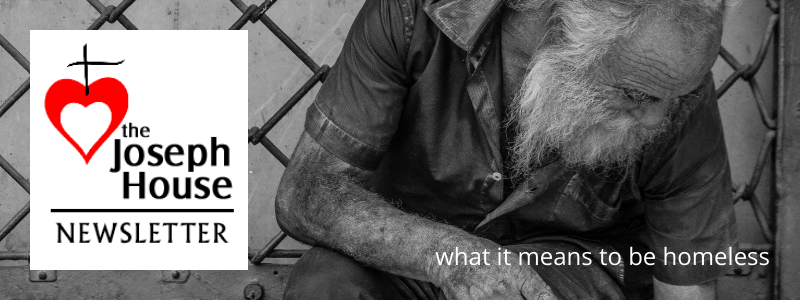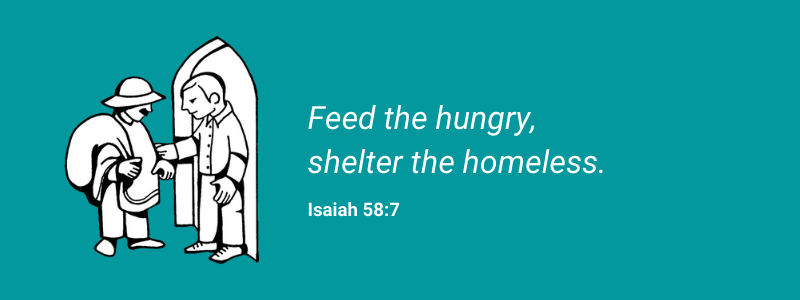Newsletter: May 2021

Dear Friends of Joseph House:
To be homeless means more than just being without shelter. It means to go without everything implied by the word “home.”
Imagine not having a bed to sleep in or a bathroom to use. Imagine not having a kitchen, with no refrigerator or freezer to store your food and no stove or oven to cook anything. Imagine no lights or heat or tap water whenever you need it. Imagine being exposed with no privacy, and yet at the same time feeling invisible because you’re ignored. A home provides many essential material things, that is true. But think of what it means to feel “at home,” to feel safe and secure and at peace. There we see the full value of having a place to call home—and the tragedy to be without one.
In responding to the issue of homelessness, there are two schools of thought: the “housing ready” approach says we need to take care of someone’s problems before he or she is ready for housing, while the “housing first” approach says we need to give someone a place to live before anything else can be done. Studies indicate that the latter is more effective. A person who is homeless has a better chance of dealing with other issues when he or she has a fixed address.
Our founder, Sr. Mary Elizabeth, had this in mind when she opened the Joseph House Village, a transitional housing facility for women and children, back in 1991. Her rationale:
“We need to give them time when they’re secure and can put their minds on developing themselves and not worrying about what they’re going to eat or where they’re going to sleep.”
It was this “nagging realization” that led to the Village (which later became independent and renamed the Village of Hope), and then the Joseph House Workshop, our residential program for homeless men.
Some people who experience homelessness need the services provided by facilities like the Village and Workshop. Some, but not all: the leading cause of homelessness is the lack of affordable housing. This is a problem across the country. At the Joseph House Crisis Center, we see many people who pay anywhere from 50 to 90% of their income and wages on rent. Paying this much isn’t sustainable, of course. It initiates a chain reaction of difficulties, including the very real possibility of getting evicted.
For someone with a low income, a housing voucher from the federal government’s subsidized housing program offers hope. With a voucher, a tenant pays 30% of his or her income toward the rent and the government pays the remainder. This type of rental assistance can make a world of difference. A study from New York City, for example, found that only 1% of families who left a homeless shelter for subsidized housing were homeless again within a year (the rates of recurrence are typically much higher). Unfortunately, funding for this program is no match for the need. Waiting lists are measured in years.
Having a place to call home is the foundation for getting on with life. There are many circumstances that lead to homelessness, and even when someone does have a place to live it’s not always healthy, happy, and safe. Through our work at Joseph House, we meet people wherever they are on their journey and do what we can to help. Through your prayers and support, you are part of this effort too.

Byron, 36, became homeless after he lost his job. He lived in his car with his 15-year-old son. Sometimes they got a respite in the house of a friend or acquaintance. Byron found a new job and then an apartment that seemed affordable. Moving in, however, was going to cost $1,125! That was the total for the deposit and the first month’s rent. It’s hard to save up that amount on low wages. We contributed $325 so Byron and his son would not be homeless anymore.
Darius lived in an old house that had been subdivided into two apartments. The house caught on fire and was badly damaged. Darius lost most of his belongings. He has fused bones in his ankle, the result of an injury sustained from falling off a ladder. Finding work is difficult for him. Darius had $400 to spare to move into a new place, but it was not enough. We paid the remaining $350 to the landlord.
Zachary is 80. His housemate suffered a stroke and had to go to a nursing home. Zachary is now solely responsible for the rent, which takes 97% of his Social Security. He’s not sure what to do. With nothing to pay toward his overdue gas bill, we contributed $350 to prevent a disconnect.
Vivian, 40, cannot walk because of an undiagnosed medical condition that is causing a buildup of fluid around her spinal cord. She has no income at the moment and no family in the area. Although Vivian’s landlord is sympathetic to her situation, he said he’d have to evict her if he didn’t receive any payment for the rent. Vivian reached out to many organizations for help to no avail. Then she contacted us. We sent $300 to her landlord.
Antoinette is only 20 and trying to get settled on her own. Her father is in prison and her mother is a drug addict. Antoinette found a job cleaning houses. Her grandmother, who has subsidized housing, gave her a place to stay. This was in violation of the lease, and if it was discovered they would both get evicted. Antoinette was desperate to move, but the deposits were steep everywhere she looked. We contributed $300 so Antoinette could move and her grandmother’s housing would not be in jeopardy.
Marlon, 64, is living on a fixed income in a trailer park. The lot rent takes 50% of his monthly check. There was a bad water leak underneath his mobile home, which can easily happen when the pipes are not properly insulated. Paying off the repair bills plus the huge water bill left Marlon with nothing for his other expenses. We paid $300 toward his electric bill to prevent a cut-off.
No matter what the need is, we are here to help. Thank you for your continued support of Joseph House. We appreciate you very much!
Springtime and Mother’s Day always inspire us to celebrate the gift of life. This is a time of renewal, and even though the covid cloud is still over us, we feel in our hearts a sense of hope. We pray for the world and we pray for you, that God in His great love for you will bless you and keep you safe. And may special blessings rest gently upon all mothers, God’s co-creators who fashioned the first home for each one of us.
Your Little Sisters of Jesus and Mary
The Joseph House depends on you. You can make a donation here: Donate.
Please send us you prayer requests so we can pray for you: Contact Form.

To Be Homeless
To be homeless means that you have no place to hang up your coat, or your skirt, or your tie.
There are no pegs to put them on. The size of a closet doesn’t matter anymore. Only paper bags.
To be homeless means that you can never “put out the dog”—or the cat, or go to the door and call them inside and have their dish of food ready by the frig, and pet them as they lie by your rocking chair and curl up by the fire.
To be homeless means that you can never put up the window to let fresh air inside, nor close it to keep out the cold. You just look through other people’s windows.
To be homeless (if you have children) means that you cannot take them out and then say to them, “Come on, honey. It’s time to go home.” Nor tuck them in their own beds and read them a bedtime story, and turn out the light and say prayers with them. You just survive.
To be homeless means that you have no medicine cabinet to search for an aspirin, no telephone
to use to dial your doctor, no health care plan to refer to if you end up in the hospital, no sense of dignity to sustain you when you faint and fall soundlessly on the sidewalk.
To be homeless means that you will not be among those who decide whether they will eat in the kitchen or the dining room or maybe on the patio, nor whether they will barbeque hamburgers or steak, or have cold Pepsi and potato salad and pickles, or who will do the dishes afterward and put them in the cupboard.
To be homeless means that you join the millions of refugees across our world who roam from place to place without shelter, who agonize because they must beg or depend on people who have to give to them, and often those who have are afraid that if they give, they will have to look you in the face, and that will hurt more than they can bear.
by Peggy Heiner
